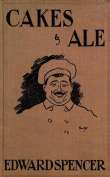أنت هنا
قراءة كتاب Cakes & Ale A Dissertation on Banquets Interspersed with Various Recipes, More or Less Original, and anecdotes, mainly veracious
تنويه: تعرض هنا نبذة من اول ١٠ صفحات فقط من الكتاب الالكتروني، لقراءة الكتاب كاملا اضغط على الزر “اشتر الآن"

Cakes & Ale A Dissertation on Banquets Interspersed with Various Recipes, More or Less Original, and anecdotes, mainly veracious
unmixed with horse-beans, dandelion-root, or road-scrapings, forms a most agreeable beverage to those who can digest it, was not known to the Greeks or Romans, but has been used in Abyssinia and along the north-east coast of Africa almost as long as those parts have been populated. Here, in merry England, where coffee was not introduced until the eighteenth century, it was at first used but sparingly, until it almost entirely took the place of chocolate, which was the favoured beverage of the duchesses and fine madams who minced and flirted, and plotted, during the reign of the Merry Monarch, fifty years or so before. The march of knowledge has taught the thrifty housewife of to-day to roast her own coffee, instead of purchasing it in that form from the retail shopkeeper, who, as a rule, under-roasts the berry, in order to “keep the weight in.” But do not blame him too freely, for he is occasionally a Poor Law Guardian, and has to “keep pace with the Stores.”
During the Georgian era, the hard-drinking epoch, breakfast far too often consisted chiefly of French brandy; and the first meal was, in consequence, not altogether a happy or wholesome one, nor conducive to the close study of serious subjects.
The history of
The Staff of Life[1]
would require a much larger volume than this, all to itself. That the evolution of bread-making has been very gradual admits of no denial; and as late as the Tudor and Stuart periods the art was still in its infancy. The quality of the bread consumed was a test of social standing. Thus, whilst the haut monde, the height of society, lords and dukes, with countesses and dames of high degree, were in the habit of consuming delicate manchets, made of the finest wheaten flour, of snowy purity, the middle classes had to content themselves with white loaves of inferior quality. To the journeyman and the ’prentice (who had to endure, with patience, the buffets of master and mistress) was meted out coarse but wholesome brown bread, made from an admixture of wheat and barley flour; whilst the agricultural labourer staved off starvation with loaves made from rye, occasionally mixed with red wheat or barley. The introduction of
Free Trade
—by no means an unmixed blessing—has changed all this; and the working-classes, with their wives and families, can, when out of the workhouse, in the intervals between “strikes,” enjoy the same quality of bread, that “cheap loaf” which appears on the table of the wicked squire and the all-devouring parson. In Yorkshire, at the present day, almost the worst thing that can be urged against a woman is that she “canna mak’ a bit o’ bread.”
“Just look,” wrote an enthusiastic Free Trader, a quarter of a century ago, “at the immense change that has latterly taken place in the food of the English peasantry. Rye bread and pease-pudding exchanged for wheaten loaves. A startling change, but not greatly different from what has occurred in France, where, with the abuses of the Bourbon rule, an end was put to the semi-starvation of French tillers of the soil. Black bread is now almost as much a rarity in France as on our side of the Channel; while barley in Wales, oats in Scotland, and the potato in Ireland, are no longer the food-staples that they were.”
I have no wish for anything of a contentious nature to appear in this volume; but may deliver, with regard to the above, the opinion that pease-pudding is by no means despicable fare, when associated with a boiled leg of pork; and I may add that too many of the English peasantry, nowadays, have been reduced, by this same Free Trade, to a diet of no bread at all, in place of wheaten, or any other loaves.
Wedding breakfasts, with the formal speeches, and cutting of the cake, have gone out of fashion, and the subject of the British breakfast of to-day demands a new chapter.
CHAPTER II
BREAKFAST (continued)


